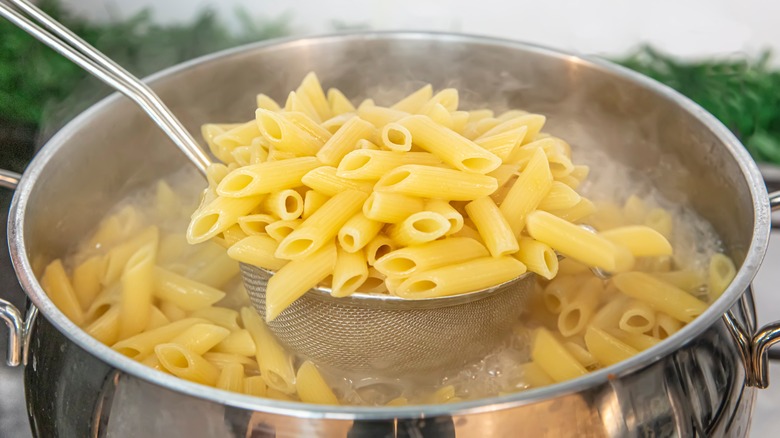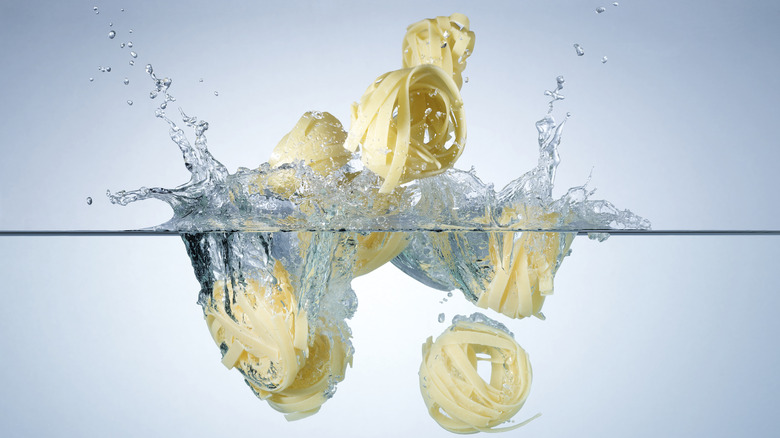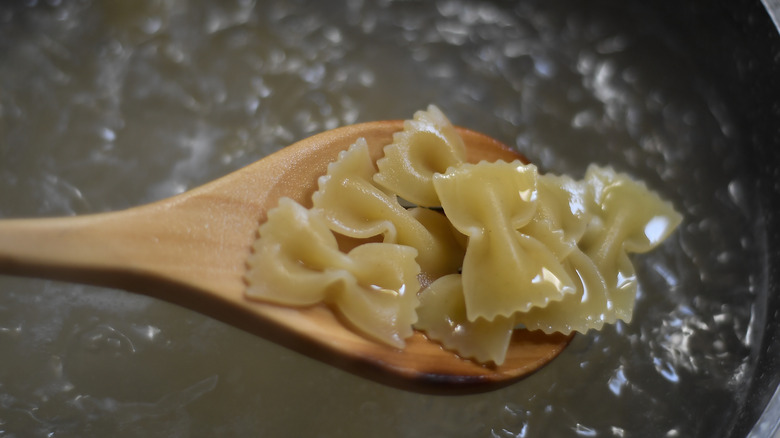How Much Water You Should Actually Use To Boil Pasta
On the surface, boiling pasta seems like one of the most basic culinary tasks, yet this simple act has been scrutinized by chefs for generations. Each element of the process must be carefully considered: the type and amount of pasta to use, the size of the pot, how much to salt the water, and most fundamental of all, how much water to use in the first place.
If you didn't know by now, leftover pasta water is culinary gold. The best Italian chefs always add a splash of it to their sauce to thicken it, and help it cling to the pasta. You see, as your pasta boils, some of the starch on the surface of each noodle diffuses into the water. This starch is the key to thickening sauces, and making them cling to the noodles. However, you need the right ratio of starch to water, which begs the question, how much water should you use to boil pasta?
There's a piece of conventional wisdom that you'll find in many pasta cooking guides. It says that you should use 5 quarts of water for every pound of pasta. But if you dig deeper, the reasoning behind this standard is a bit flimsy. It turns out that you can cook pasta in a much smaller volume of water, which not only gives you starchier water for saucing but more importantly, sends less water down the drain at the end of the day.
Debunking the five-quart rule
So, what basis, if any, is there for the 5 quarts to 1 pound rule? Writing for Serious Eats, chef J. Kenji López-Alt lists four reasons. First, more water equals more thermal mass, which is to say that, after you add your pasta, the water should return to a boil faster. Second, more water means more space for the pasta, preventing noodles from sticking to each other. Third, too much starch in the water could make the pasta sticky. The fourth (and likely the biggest) reason is that it's tradition.
When López-Alt put this reasoning to the test, however, he discovered that it doesn't all hold up. Regarding reason number one, as you keep your burner at a consistent heat, it takes the same amount of energy to return the water to a boil after you add the pasta, so the difference in volume doesn't matter. However, larger pots can actually take longer to return to a boil because the increased surface area leads to more heat loss. As for the second reason, you don't need to worry about your noodles sticking as long as you stir. Finally, those fears of overly starchy water are entirely unfounded. It's actually a good thing, as it will emulsify the pasta sauce better. The more you dig, the less sense the old five-quart rule makes, so how much water should you really be using?
You don't need as much water as you might think to cook pasta
López-Alt found the most success using 3 quarts of water to 1 pound of pasta, but you can actually go even lower than that. New York Times writer Harold McGee conducted a scrupulous series of experiments and found he could achieve a perfectly al dente pound of pasta in just one and a half quarts of water. To do so, he added the pasta to the pot while the water was still cold so that it was partially cooked by the time it reached a boil. This flies in the face of conventional Italian wisdom, but it does work for dried pasta. However, there are exceptions. You cannot do this method with fresh pasta, as it will become mushy. Nor can you do it with long noodles like spaghetti or linguine, as they need more water to fully submerge, and are more likely to stick to each other than other shapes.
Before we go, let's debunk another pasta boiling myth. Some people say you should add olive oil to your pasta water; don't listen to them. Oil supposedly prevents the noodles from sticking to each other, but as previously mentioned, you don't need to worry about that as long as you stir the pot frequently. The real effect of adding oil to your pasta water is that it slickens the noodles so the sauce won't cling to the pasta as well. One final word: never, ever rinse your pasta.


